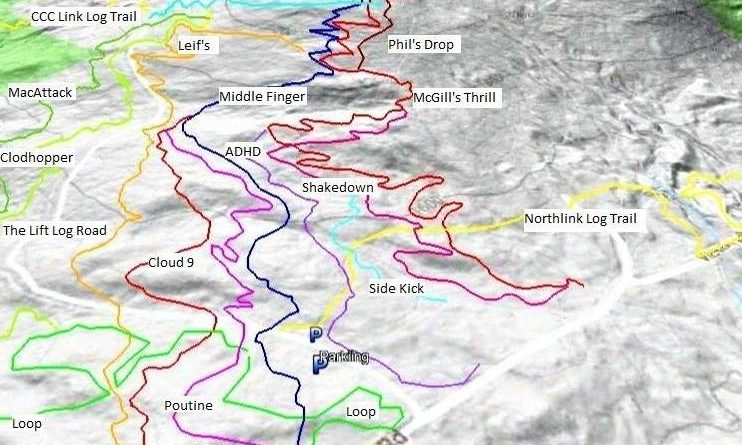The Victory Hill Sector Shuts Down
By VTDigger/Justin Trombly
The Victory Hill Sector, a destination for mountain bikers across the region and the world, has closed down indefinitely following an Act 250 ruling that the trail network must apply for a commercial development permit.
John McGill, who runs day-to-day operations at the trails, said the nonprofit overseeing the network shouldn’t be considered a commercial developer. And as many things in Victory seem to go, he believes the state’s action was spurred by the town’s long history of infighting.
“Everything was really picking up momentum and feeling great, like everybody supported what we were doing,” McGill said. “And then to have this Act 250 ruling really just crushed me.”
The May 3 ruling from the Natural Resources Board says that trail repairs at Victory Hill fall under the scope of Act 250 because the nonprofit collects fees and donations from bikers.
Erosion repairs on former logging paths within the network are “highly commendable,” Kirsten Sultan, coordinator for the Natural Resources Board’s district in the Northeast Kingdom, wrote in the opinion.
But “it is also easily distinguishable from the work that occurred to create the … recreation trail system, which has encompassed recreation-trail specific improvements such as ‘single track’ trails, jumps and features, and new trail construction along new cleared corridors through wooded areas,” Sultan continued, all work she believed benefited the Victory Hill Sector’s commercial efforts.
Sultan focused in particular on trail improvements made between 2015 and 2018. She pointed as well to a tent set up outside the home of Carol Easter on Victory Hill Road, where Easter sold visitor passes and shirts for the trail network.
McGill said the ruling is an example of how Act 250, a 1970 law meant to balance conservation and development, has been weaponized against outdoor recreation efforts.
“We just don’t see why Act 250 should be regulating trails like they’re commercial development,” he said. To him, the Victory Hill Sector’s activities have been “more of a local, pay-as-you-go fundraising model,” rather than commercial development.
McGill registered the Victory Hill Sector as a nonprofit in January of this year, according to state records.
He and his attorney, Hans Huessy, have argued that the Victory Hill Sector was part of the Kingdom Trails Association network until August 2018. In their view, that means the Victory bike grounds were by extension part of the Vermont Trails System, of which Kingdom Trails is a member. Membership would exempt Victory Hill from Act 250 regulations, Huessy and McGill believe, however an application to join Vermont Trails System is still pending.

The setting of the Victory Hill Sector trails. Photo courtesy Victory Hill Sector
Christopher Roy, a lawyer for Kingdom Trails, asked Sultan in a June 14 letter to let the organization join the case because its relationship with the Victory Hill Sector is at the heart of the dispute.
The implications of the case go beyond what happens with the Victory Hill Sector, Roy wrote, because they could impact Kingdom Trails’ relationships with other landowners. A representative for Kingdom Trails told VTDigger that the association plans to provide information as needed in the legal dispute, but offered no opinion on the underlying matters.
Huessy argued, in a June 3 request for reconsideration, that construction improvements on the Victory Hill Sector lands have covered too small an area to be subject to Act 250 rules. And he said the tent run by Easter is not substantial enough to fall under the regulations.
Conservation roots
What became the Victory Hill Sector started in the mid-2000s, when a company called Conservation Collaboratives bought 1,100 acres of forest in Victory. Laury Saligman, who is married to McGill, founded the company. The land had been owned by a logging company, which left behind eroded roads and skid trails.
In 2009, Conservation Collaboratives repaired several of the trails and began building recreational trails. That same year it partnered with Kingdom Trails to host CircumBurke, an annual bike race on trails around the Burke and Umpire mountains. CircumBurke would later be voted the best mountain-biking race in the state by readers of Vermont Sports in 2016.
The Victory Hill Sector also hosted the final round of the 2018 Enduro World Series North American Continental Championship, an off-road mountain biking competition.
McGill said between 2,700 and 3,000 people visited the trail network last year.
“It’s been quite the hot topic before this Act 250 thing came up,” he said. “Now the huge fanbase is wondering what is up.”

A trio of mountain bikers on a Victory Hill Sector trail. Photo courtesy Victory Hill Sector
Victory Town Clerk Tracey Martel agrees. “The people who ride up there are really bummed,” she said. But, she asked, “Why not just file the paperwork?”
McGill’s answer: The paperwork and the process would be too cumbersome.
Town Clerk’s Inquiry
The state review of the Victory Hill Sector came after an inquiry from Martel. McGill believes she was motivated by vengeance, joining a long list of fights between factions in the small town.
“This looks like it’s completely a symptom of us getting in the middle of the Hatfields and McCoys of Victory,” McGill said, pointing to his work with Easter, who ran against Martel for the clerkship in 2017.
Easter won by a handful of votes, but Martel went to court, and a judge ruled in 2018 that votes from part-time residents didn’t count in the election. Martel was elected at the town’s annual meeting that March.
“I don’t have any longstanding feud,” Martel told VTDigger. “I’ve only been in Victory for five years.”
She said she went to the state to see whether the Victory Hill Sector had a permit — or if it even needed one — like other businesses in the area. She described seeing one neighboring business owner who had been hampered by the regulations.
The lawsuit was a separate issue entirely, she claimed. “This has nothing to do with that,” she said. “It is taking care of the town.”
McGill said the trails will stay closed for the foreseeable future and that planned events have been moved or canceled. If the Victory Hill Sector isn’t accepted into the Vermont Trails System, and his appeal of the Act 250 ruling is shot down, he said he and his wife may move on to something else.
“We feel that it’s really untenable to expect to have an outdoor-recreation economy in Vermont if host landowners, who have no lucrative goal in mind other than to make trails available, are saddled with Act 250,” he said. “Vermont will lose one of the best trail systems it has.”


